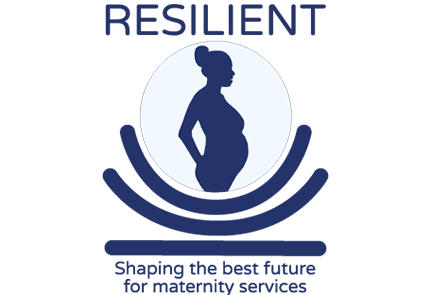In two trusts providing maternity care in south London (Guy’s and St Thomas’ and King’s College Hospital NHS Foundation Trusts), the research team aim to study the impact on women and babies of Covid-19 pandemic-related maternity service configuration (i.e., virtual care, out-of-office monitoring, and vaccination), particularly those from minority ethnic groups or leading socially or medically complex lives.
There are three objectives to be addressed by quantitative, social science, and policy research:
- Work package (WP1): For all pregnancies, to study the impact on maternity care quality (effectiveness, safety, and acceptability), maternal and offspring outcomes, and costs within the context of: maternity care service configurations, particularly: virtual consultations; out-of-office monitoring (eg, patient reported blood pressure); and Covid-19 vaccination (ie, provision, uptake, and adverse events).
- WP2: Explore and describe the perceptions and experiences of pregnant and postpartum women (as well as partners, healthcare providers, and policy makers) during the pandemic, with a focus on those who: identify with an ethnic minority groups; have medical or mental health co-morbidities; and/or live with social complexity, including socioeconomic deprivation.
- WP3: Across the four nations, engage with stakeholders to develop policy interventions for local, regional, and national health systems.
How will the project be carried out?
WP1: Quantitative - describe, quantify, and explain
They will use routinely-collected, linked maternity, mental health, and offspring data from the MRC funded early-LIfe data cross-LInkage in Research platform (˜35,000 records currently) from a diverse area, South London. We will describe and quantify temporal trends in relevant health outcomes and costs, by service reconfiguration and inequalities, using segmented and individual-level multivariate regression. We seek a coherent pattern of results to be interpreted in light of WP2 findings.
WP2: Social science - enrich understanding
They will carry out in-depth interviews with a maximum diversity sample of 105 pregnant/postpartum women, partners, care providers, and policy makers, with lived experience of maternity services during the pandemic. Interview schedules will explore what changed in care, its personal meaning, and confidence about care, analysed qualitatively (eg, thematic framework analysis). Questionnaires administered to maternity service users nationally (˜43,000) via the Covid Symptom Study (CSS) Biobank, recruiting participants from the King’s College London-CSS/ZOE app, to understand vaccine uptake, hesitancy, and side effects, and the impact of the pandemic on early parenting.
WP3: Stakeholder engagement
They will hold regional listening events (‘Imaging our best future’) in each UK nation which will assess WP1 and WP2 findings; brainstorm, shortlist, and prioritise high-impact future actions; and understand relevant facilitators and barriers to implementation. They will hold a National Policy Lab (‘co-production for action’) to explore listening event findings and produce an ‘Imagine our best future’ report for dissemination.
Read further information on work packages
Our collaborators
Numerous organisations, charities, and trusts, nationally including: Royal College of Midwifery; Royal College of Obstetrics & Gyaecology; Tommy's Charity; Sands; Birthrights, Fertility Network UK; National Childbirth Trust, Local Maternity Voices Partnership; Covid Symptom Study (CSS) Biobank; Univeristy of Warwick; The Dartmouth Institute; St George's University Hospitals NHS Foundation Trust.
Potential benefits of this research
The pandemic has forced NHS maternity services to undergo substantial change. While harms have been evident, there are also potential positives, such as: new ways of working that may facilitate equity of access to care, better targeting of services, cost reduction from health system and patient perspectives (virtual vs. face-to-face care), and acceptability. This is an opportunity to ‘build back better’ while there is political will for reform that is data-driven.
How patients, service users and the public are involved in the research
Patient and public involvement and engagement (PPIE) was embedded throughout the project proposal development and will continue throughout the project in the following ways:
- Service users and south London community - 31 South London service users with experience of maternity care during the pandemic joined interviews or focus group discussions. Minority ethnic group members and those living with social (eg, migrant) or medical complexity (eg, subfertility) were represented, including prior Covid-19. There was support for a mixed methods study design. They stressed the need to have information specific to minority ethnic groups or those with co-morbidities, aligning with our modest plans for in-depth interviews with such service users. Concerns were raised about digital poverty, prompting us to ensure provision of relevant support in our budget.
- Networks and engagement organisations We will work collaboratively, providing mentoring and aiming for equitable involvement of: voluntary sector organisations; social media networks (e.g. Facebook, Instagram, Twitter); individual women; and the ARC’s Maternity and Perinatal Mental health PPIE Advisory Group.
- Working together - Our PPIE Advisory Group will meet every four months, to assist information-sharing and facilitate research co production. Early meetings will focus on introduction to the study team, research, and embedded PPIE. A key element of training will be identifying needs and interests, signposting to useful resources, FAQs, and ongoing support. PPIE members will synthesise results and conclusions of PPIE activities and feed back to researchers; write PPIE sections of project reports, blogs, ARC South London newsletter articles, and social media posts; and contribute to the design of guides.
- Support and learning - service users’ comfort with participation will be supported with a group pre-meeting, a personal phone call or email, and another for follow-up if required. Awareness of trauma-informed ways of working will be accomplished through training with Birth Companions Charity that works with women coping with social complexities and challenges.
- Impact - the core team will report back to PPIE members at each Advisory Group meeting about how their feedback has influenced the research. PPIE members will also: shape how the impact of PPIE on the research will be measured, participate in interpreting results, and be invited to read draft reports and manuscripts.
- Governance - PPIE voices will be appropriately resourced, regularly reviewed, and reported on.
Read more about the patient and public involvement group advisory group.
Find out more on Twitter @resilient_KCL
This project is funded by the NIHR Health and Social care Research Delivery Research (HSDR) programme. It was adopted by ARC South London in October 2021 and will be completed by October 2023.




